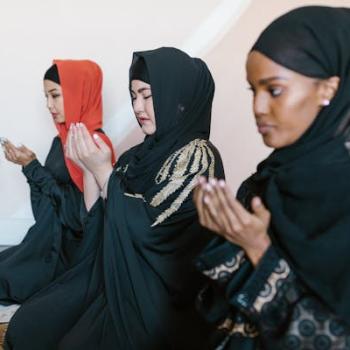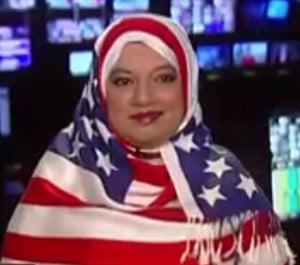Normally, whenever I see anything with the phrase “Behind the veil” I automatically cringe and get myself ready for Orientalist stereotypes and generalizations about Muslim women. Na’ima B. Robert’s “Behind the veil: the online diary of a British Muslim woman” isn’t quite so bad. Although at first glance it does seem that way, especially considering that a picture of a niqabi is accompanies the ad for the piece on the Times website (below left). Robert actually does wear niqab, so that maybe why there is a picture of a niqabi.
 Even though the piece is entitled “online diary of a British Muslim woman” there is actually very little about Robert’s own life. In fact, most of the essay is Robert telling us that veiled women (whether in niqab or hijab) are just ordinary women trying to negotiate Islam and living in the West. I appreciate Robert reinforcing that point, but I didn’t appreciate how she went about it.
Even though the piece is entitled “online diary of a British Muslim woman” there is actually very little about Robert’s own life. In fact, most of the essay is Robert telling us that veiled women (whether in niqab or hijab) are just ordinary women trying to negotiate Islam and living in the West. I appreciate Robert reinforcing that point, but I didn’t appreciate how she went about it.
The one thing that I found so wrong with this essay is that Robert committed the same exact mistake that is committed by non-Muslims: she made Muslim women into this monolithic group. There is no diversity in Robert’s view of Muslim women. We are all caught between “secular” society and the “dunya” (worldly life), we all wear the veil, we’re all looking to get married and we all have lots of babies if we are married. It seems that Robert thinks you are an unobservant Muslim if you do fit these characteristics. In fact, she mentions “religious Muslim woman” and “observant Muslim woman” in the same paragraph of her essay almost as if to say “I’m speaking about the real Muslim women.” It’s a very limiting view of Muslim women and it’s even a limiting view of Muslim women who consider themselves “observant”. In fact, I wonder what Robert’s definition of “religious” and “observant” would be. If a woman observes all the five pillars of Islam but doesn’t wear hijab is she non-observant? If a woman wears the veil but has no intention of having lots of children despite being married is she non-observant? Should she be the one to define “observant”?
Additionally, I think Robert actually did more of a disservice to her goal than a service. What is I mean is that even though she sought to normalize Muslim women, she once again otherized us. She made us seem as if we’re just in a Western society instead of a part of Western society. She constantly made the point that Muslim women are negotiating space between two worlds, Islamic and Western, once again setting up the “Islam/West” binary. Why is it that Muslims are only assumed to negotiate two spaces in a Western context? No one assumes that Indian Muslims, Filipino Muslims, or Chinese Muslims are negotiating two spaces even they are all minorities in their societies. This isn’t to say that Muslims don’t have unique customs and practices. However, all groups in every society do. Thus, I wonder why Robert felt the need to differentiate between her “Islamic” world and the “dunya” throughout her article. She does feel part of her community, even saying that chooses to “have a foot” in “both camps”. Thus, I wish that she didn’t feel the need to constantly differentiate and to let her readers know that Muslims are one group among many in a hetergenous society.













